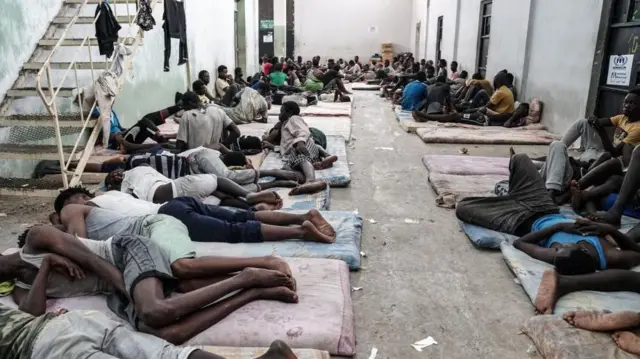Libya Prison Abuse Investigation: Senior Official Detained Over Torture Allegations
Libya’s Attorney General has ordered the detention of a senior prison official, Osama al-Masry Njeem, as part of an investigation into alleged torture and other abuses at a Tripoli detention facility that led to the death of an inmate. The move, announced in an official statement on Wednesday, marks a rare effort by Libyan authorities to hold a high-ranking security figure accountable for human rights violations inside the country’s detention system.
According to the Attorney General’s Office, a specialized investigation team interrogated Njeem and gathered evidence of “incidents of torture and cruel, inhuman, and degrading treatment” inflicted on at least ten prisoners, “leading to the death of one of them as a result of torture,” the statement said. After establishing sufficient evidence implicating Njeem in the alleged acts, prosecutors ordered that he be held in pretrial detention and referred the case to a criminal court, as part of what officials described as a national drive to prosecute abuses in detention facilities.
Njeem, often identified as the director of Tripoli’s main Correctional and Rehabilitation Institution (also known as Mitiga prison), was serving as head of Operations and Judicial Security at the Judicial Police Authority – a role that effectively put him in charge of key prisons in the capital. It was not immediately clear when Njeem was taken into custody or if he has responded to the charges, and Libyan authorities have not disclosed further details about the circumstances of the inmate’s death. The Attorney General’s statement noted that the investigation examined abuses against a total of ten inmates, suggesting a pattern of mistreatment beyond the single fatality.

International Warrants and Past Controversy
The detained official has long been accused by rights groups of running an abusive detention regime. Njeem was previously the subject of an International Criminal Court (ICC) arrest warrant on suspicion of war crimes and crimes against humanity for acts committed at Tripoli’s Mitiga prison. The ICC alleges that from 2015 onward, he “committed, ordered or assisted” in murder, torture (including rape), and other serious crimes against detainees. Mitiga prison, where these abuses allegedly occurred, is under the control of a powerful militia known as the Special Deterrence Force, or DACTO, which has been formally integrated into the Tripoli government’s security forces.
Earlier this year, Njeem’s case drew international attention and controversy when he was briefly arrested in Italy on the ICC warrant. In mid-January, Italian police detained him at a hotel in Turin, but he was released two days later after Prime Minister Giorgia Meloni’s government said there were procedural irregularities with the warrant. Italy’s decision to swiftly repatriate Njeem to Libya prompted outrage from human rights organizations, which described his release as a “serious setback” to accountability for grave crimes. The ICC itself formally complained about Italy’s handling of the case, and Italian opposition lawmakers demanded an inquiry into the affair.
Since returning to Libya, Njeem remained a senior figure in the security apparatus until this investigation. Libyan prosecutors have been coordinating with international authorities as the case progresses. Officials confirmed they requested assistance from the ICC in obtaining documentation related to Njeem’s alleged crimes, as part of what the Attorney General’s Office called “coordinated efforts between national and international justice systems to ensure accountability and prevent impunity”. Investigators had previously questioned Njeem in April in the presence of Libyan prosecutors, pending the ICC’s cooperation on evidence, according to the official statement.
Detention System Under Scrutiny
Libya’s detention facilities – especially those in the capital – have long faced accusations of brutal mistreatment. Mitiga Prison in Tripoli, where Njeem and the Special Deterrence Force wielded control, has been the focus of repeated reports by United Nations experts and human rights groups. Amnesty International, for example, has documented what it calls “horrific violations committed with total impunity” at Mitiga, including “torture and other ill-treatment, unlawful killings, enforced disappearances,” and other serious abuses. Despite these reports, militia leaders accused of such crimes were often absorbed into official institutions with promotions and salaries, a practice critics say has emboldened them to commit further abuses while shielding them from accountability.
The case against Njeem is being seen as a crucial test of Libya’s willingness to confront abuses within its own ranks. Some international advocates continue to urge Libya to surrender Njeem to The Hague, arguing that only an ICC trial can ensure justice given Libya’s fragile judicial system. For now, Libyan authorities appear intent on prosecuting him domestically under national law, in what they tout as a step toward ending impunity for abuses.
The nation has struggled to establish the rule of law in the decade since the 2011 uprising that ousted longtime dictator Muammar Gaddafi. It has known little stable governance or security in that time. Power is divided between rival administrations in the east and west, and armed groups exercise considerable influence over state institutions – including prisons. Past attempts to reform the prison system were hindered by the presence of militias operating with autonomy and by the weakness of judicial oversight in a country mired in conflict.
In this context, the decision to detain a figure like Osama Njeem is highly unusual – and for many observers, significant. It comes amid mounting international pressure on Libya’s unity government in Tripoli to address human rights violations. Libyan officials have framed the move as part of a broader effort to improve the country’s human rights record and restore credibility to its justice system. Whether the prosecution of Njeem will lead to broader reforms or accountability for others accused of abuse remains uncertain. But for the family of the unnamed prisoner who died and for the survivors of torture in Libyan jails, the case represents a rare promise of justice in a system where it has long been in short supply.




